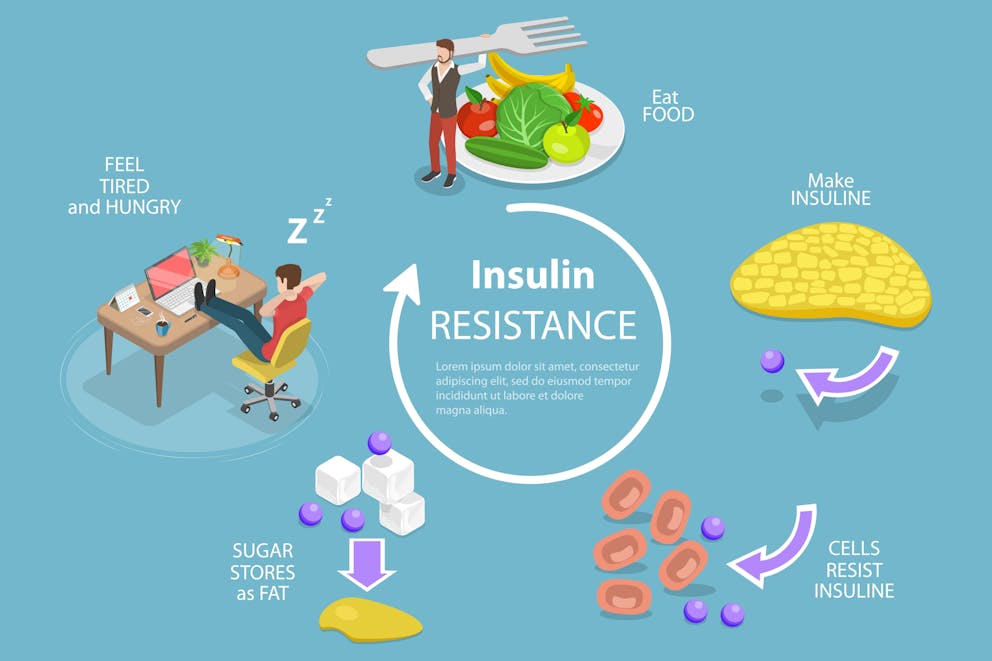28 Fat Storing Hormone Resistance Symptoms
Have you ever wondered why you're always tired after meals or constantly craving carbs? These could be signs pointing towards a common yet often overlooked issue—insulin resistance.
This condition affects many people, but recognizing its symptoms early can make all the difference in managing it effectively.
You might think frequent urination at night is just part of aging, or that sudden weight gain around your belly is due to stress eating.
But there's more to these changes than meets the eye. Understanding what's happening inside your body is crucial for taking control of your health.
Understanding Insulin Resistance
Insulin resistance is a condition that affects millions of people worldwide, yet many don't even know they have it. It occurs when your body's cells become less responsive to the hormone insulin, which plays a crucial role in regulating your blood sugar levels.
When you eat carbohydrates, your body breaks them down into glucose, which enters your bloodstream. In response, your pancreas releases insulin to help transport the glucose into your cells, where it's used for energy.
However, when you have insulin resistance, your cells don't respond properly to insulin, causing glucose to build up in your blood.
What is Insulin Resistance?
Imagine your cells as locks and insulin as the key. In a healthy body, insulin easily unlocks the cells, allowing glucose to enter. But with insulin resistance, the locks become rusty and the key doesn't work as well.
Your pancreas tries to compensate by producing more insulin, but over time, it can't keep up with the demand.
This can lead to persistently high blood sugar levels, which can damage your blood vessels and nerves. If left untreated, insulin resistance can progress to prediabetes and eventually type 2 diabetes.
Prevalence in the Population
Insulin resistance is surprisingly common, affecting approximately 60 to 75% of the population. It's particularly prevalent among individuals with prediabetes and diabetes, as it's a key factor in the development of these conditions.
In fact, I've seen countless patients in my practice who had no idea they were insulin resistant until we ran some tests. Many of them were struggling with weight gain, fatigue, and other symptoms they couldn't explain.
Once we identified insulin resistance as the root cause, we were able to develop a plan to reverse it and improve their overall health.
Common Symptoms of Insulin Resistance
Insulin resistance is often called a "silent" condition because it can develop gradually without causing noticeable symptoms. However, there are several signs that may indicate you have insulin resistance, including:
Frequent Urination at Night
If you find yourself waking up multiple times during the night to use the bathroom, it could be a sign of insulin resistance. When your blood sugar levels are consistently high, your kidneys work overtime to filter out the excess glucose, leading to increased urination.
Increased Hunger and Carbohydrate Cravings
Do you feel hungry all the time, even after eating a meal? Do you have intense cravings for carbohydrate-rich foods like bread, pasta, and sweets? These could be signs that your cells aren't getting the glucose they need, causing your body to signal for more food.
Post-Meal Fatigue
Many people with insulin resistance experience a sudden drop in energy levels after eating, especially after consuming carbohydrates. This is because your body is struggling to process the glucose, leaving you feeling tired and sluggish.

Belly Fat and Weight Gain
Insulin resistance can make it very difficult to lose weight, particularly in the abdominal area. This is because high insulin levels promote fat storage, especially in the belly region.
If you've been trying to lose weight without success, insulin resistance could be a contributing factor.
Other common symptoms of insulin resistance include:
Abnormal cholesterol and triglyceride levels
High blood pressure
Fatty liver
Polycystic ovarian syndrome (PCOS)
Darkened skin folds (acanthosis nigricans)
Skin tags
Elevated blood glucose levels
Metabolic Health Indicators
In addition to the symptoms mentioned above, there are several metabolic health indicators that can signal insulin resistance. These include:
Cholesterol and Triglyceride Levels
Insulin resistance can cause an imbalance in your lipid levels, leading to high LDL ("bad") cholesterol and triglycerides, and low HDL ("good") cholesterol. This unhealthy combination increases your risk of heart disease and stroke.
Blood Pressure Concerns
High blood pressure is another common sign of insulin resistance. When your cells are resistant to insulin, it can cause your blood vessels to constrict, leading to increased blood pressure.
This puts extra strain on your heart and can damage your blood vessels over time.
Skin Changes as Symptoms
Insulin resistance can also manifest in the form of skin changes, such as:
Acanthosis Nigricans
This is a condition characterized by darkened, velvety patches of skin, usually in the folds and creases of your body, such as your neck, armpits, and groin.
Acanthosis nigricans is often a sign of insulin resistance, as high insulin levels can stimulate the growth of skin cells.
Other skin changes associated with insulin resistance include skin tags, which are small, flesh-colored growths that often appear on the neck, armpits, and under the breasts.
Hormonal Disorders Linked to Insulin Resistance
Insulin resistance can also contribute to hormonal imbalances, such as:
Polycystic ovarian syndrome (PCOS): This is a common hormonal disorder in women that can cause irregular periods, acne, excess hair growth, and fertility issues. Insulin resistance is a key factor in the development of PCOS.
Low testosterone: In men, insulin resistance can lead to reduced testosterone levels, which can cause symptoms like fatigue, low libido, and muscle loss.
Cognitive and Mood Symptoms
Insulin resistance can also affect your brain health, leading to cognitive and mood symptoms such as:
Memory problems and dementia: High blood sugar levels can damage the blood vessels in your brain, increasing your risk of cognitive decline and dementia.
Moodiness and irritability: Fluctuations in blood sugar levels can cause mood swings and irritability, as your brain relies on a steady supply of glucose to function properly.
Other Health Conditions Associated with Insulin Resistance
Insulin resistance is linked to several other health conditions, including:
Sleep apnea: This is a sleep disorder characterized by repeated pauses in breathing during sleep. Insulin resistance can increase your risk of sleep apnea, and vice versa.
Fatty liver disease: Insulin resistance can cause fat to accumulate in your liver, leading to non-alcoholic fatty liver disease (NAFLD). If left untreated, NAFLD can progress to more serious liver problems.
If you suspect you may have insulin resistance based on these symptoms, it's important to talk to your healthcare provider. They can run tests to check your blood sugar levels and develop a plan to help you reverse insulin resistance and improve your overall health.

Spotting the Signs of Resistance
Insulin resistance is a growing concern that can lead to various health issues, including type 2 diabetes and metabolic syndrome. Recognizing the symptoms early is crucial for effective management and prevention.
Common signs of insulin resistance include unexplained weight gain, especially around the abdomen, increased hunger and cravings, fatigue, and difficulty concentrating.
Additionally, dark patches of skin, known as acanthosis nigricans, can appear on the neck, armpits, or groin.
Understanding these symptoms helps in taking proactive steps to address insulin resistance through lifestyle changes, such as improved diet and increased physical activity.
Conclusion
The next time you find yourself reaching for another snack shortly after a meal or feeling unusually fatigued post-lunch, remember—it could be more than just everyday stress or bad habits.
Insulin resistance isn't some distant sci-fi threat; it's real and it’s here now, subtly affecting our daily lives. By paying attention to these telltale signs like increased hunger, persistent fatigue, and unexplained weight gain around the belly, we can take proactive steps towards better health.
If you've noticed any of these symptoms creeping into your life recently—or if they’ve been there for a while—it might be worth getting checked out by a healthcare professional.
The earlier we catch it; the easier it will be to manage through lifestyle changes such as diet adjustments (hello keto!), regular exercise routines tailored specifically with YOU in mind!
Previous blog
The 5 Causes of BruisingNext blog
Best Oral Lichen Planus Home RemediesTags

Popular
08/21/2024
55.1K views
02/23/2025
46.4K views
11/18/2024
278.2K views
03/18/2024
11/21/2022




